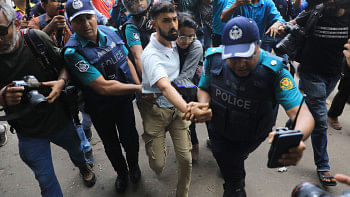Big investors seek Accord's continuation
A group of investors representing $3.1 trillion in assets appealed to the prime minister to let Accord operate until the government is fully capable of ensuring the safety of the workers employed in upwards of the 1,600 garment factories covered by the platform.
The request comes as the government is opposed to the proposition of the Accord continuing its work in Bangladesh uninhibited for three more years.
After much request, the government has agreed to allow the Accord to continue operations under a set of highly restrictive constraints that include prohibiting its inspectors from identifying any new safety violations in factories.
The Accord appealed against such restrictions and a hearing on it is scheduled to be held at the Supreme Court tomorrow.
“As investors, we are concerned,” said the letter from a group of 190 investors from 12 countries on February 12 under the banner of Bangladesh Investor Initiative.
The letter was coordinated by the Interfaith Centre on Corporate Responsibility (ICCR). David Schilling, senior programme director for human rights and resources at the ICCR, signed the letter.
Despite significant progress on worker safety measures, the Accord's work is not complete yet, it said. Bangladesh government's Remediation and Coordination Cell (RCC) does not have the capacity nor has it demonstrated the willingness to inspect factories to the same standards, it added.
A transition plan for factory inspections, safety trainings and a worker complaint mechanism will need much more time and genuine engagement by the government.
“It is vital that the Accord be allowed to continue its inspection and remediation work until that time.”
A premature closure of the Accord would mean that the companies that depend on Bangladesh for their sourcing would not be able to exercise their responsibility to respect human rights.
“We believe the positive work done by the Accord companies and trade unions can be secured by staying the course until such time as the government of Bangladesh can fulfil its duty to protect the lives and livelihood of its workers.”
The Accord was formed in May 2013 after the Rana Plaza building collapse with the view to strengthening workplace safety in garment factories by identifying loopholes in fire, structure and electrical.
The tenure of the five-year-long legally binding Accord ended in June last year, but the government extended the tenure up to November 30 last year.

 For all latest news, follow The Daily Star's Google News channel.
For all latest news, follow The Daily Star's Google News channel. 



Comments